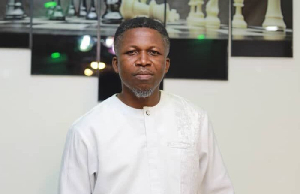Cambridge, Mass, September 14th, 2008 - The Harvard Black Men's Forum has concluded its first project under its African Development Initiative (ADI). Founded and Co-Directed by Juniors Sangu Delle (Accra, Ghana) and Darryl Finkton (Indianapolis, IN), ADI allows undergraduate students to collaborate with NGOs, African governments, international development groups, and faculty from Harvard University, MIT, and various other universities to create sustainable development projects. Along with coordinating these projects, the undergraduate students conduct research to measure the financial efficiency and social return of their development programs.
Their first endeavor, Project Access to Clean Water for Agyementi (ACWA) just took place in the Akuapem region in Ghana. According to a 2004 World Health Organization (WHO) report, Diarrhea-related diseases account for 1.8 million deaths per year worldwide. This disease burden falls overwhelmingly on children of developing countries and is primarily due to an unsafe water supply, sanitation, and hygiene. In Ghana alone, these risk factors contribute to 8,600 deaths per year and the highest burden of disease from environmental factors. Providing clean water is one of the eight Millennium Development Goals of the WHO.
Project ACWA sought to specifically address this pressing problem in the village of Agyementi – one of several rural villages in Ghana in which a large portion of the population has no access to safe water or means of sanitation and hygiene. This project model is different from similar charitable causes for Africa because "It's sustainable and holistic," Delle says. "Not only are we going to track its long-term progress leading to drastic improvements in public health, but we're going to empower the people of Agyementi through health education and the development of the necessary financial tools to maintain the water supply in a way that doesn't deprive the poorest members."
Both Delle, a native of Ghana, and Finkton saw a need to increase the involvement of students in the global community, especially the African continent, in order to bring much needed attention to those lacking life's most basic necessities. Like Delle, Finkton sees their project as different because they are employing their version of "creative capitalism," a term Bill Gates used to describe sustainable ways to fight poverty.
"Our project focuses on people, not numbers. So many times development and research are confined to GDP changes and quantitative analysis but we want to emphasize changes on a more personal level. Project ACWA is about increasing capabilities and removing barriers in creative, sustainable ways rather than providing a never ending stream of financial resources. We are working with the people of Agyementi to gain access to water, sanitation, and opportunities for all men and women in the village now, and in the future."
The Project ACWA team worked with the Akuapem Community Development Programme, Water Aid Ghana, the African Commission of Health and Human Rights Promoters, the Ghanaian Ministry of Water Resources, and the WHO in Accra to install a borehole fitted with a hand-pump, build household latrines, and promote proper hygiene and sanitation. The team reports that the project went better than planned and they received incredible amounts of support from the local people. "They understand the importance of clean water," Okereke says. "It is a matter of resources. For running schools, building clinics and hospitals, and any development needs, villages like Agyementi receive about $250 per quarter from their government. The money just isn't there. They have offered labor, their supplies, and their utmost cooperation to show their appreciation to those who have donated to this project and to display their determination to sustain their clean water source."
Having raised about $25,000 from anonymous donors and Harvard's Department of African and African American Studies and the W.E.B. Du Bois Institute for African and African American Research, Delle and Finkton spent 5 weeks in Agyementi, Ghana, along with the project Financial Director, Ndubuisi Okereke .
Delle adds "this project would not have been possible without the tremendous support of Evelyn Higginbotham, the Chair of the Department of African and African American Studies. She is the reason this project has been such a success. In fact, we have named the Evelyn Higginbotham Scholarship for the brightest student in Agyementi in her honor. The Department in general has been incredible and has given us a lot of support, both academic and financially. I also plan on using this project's experience as the foundation for my Alternative Thesis next year ."
For Harvard's BMF, Project ACWA and the African Development Initiative come from a long-held tradition of service to the underserved, which is a per semester requirement for membership. "Rather than observing poverty's devastating effects in Agyemanti and other regions," the team believes that "initiatives such as Project ACWA encourage action by exemplifying the differences students can make not only in their own communities, but in the world."
General News of Monday, 15 September 2008
Source: Project ACWA team












